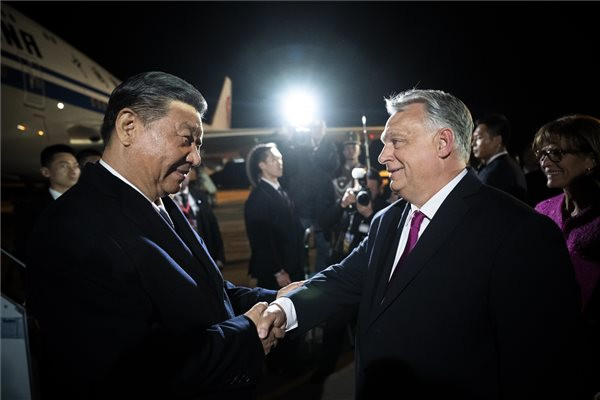Hungarian Prime Minister Viktor Orbán welcomed Chinese President Xi to Budapest on Wednesday, the last stop of the Chinese premier’s five-day European visit after Paris and Belgrade.
The visit commemorated 75 years of bilateral diplomatic relations between Budapest and Beijing.
Ahead of the meeting, President Xi praised Hungary for its “independent” foreign policy.
He was met by Orbán at Budapest Ferenc Liszt International Airport. Children dressed in Hungarian national costumes also greeted the presidential couple, offering them bread and salt according to ancient custom.
The relationship between the two nations has flourished over the past decade with trade tripling from €3 billion in 2014 to €9.4 billion in 2023, according to data from the Central Statistical Office.
According to the Institute of Hungarian Research (MKI), Hungary’s outstanding exports are quality food products such as wine. Other exports include medical devices, pharmaceutical products, various lifestyle and skill-enhancing services, water and soil improvement technologies, and high-tech services used in industrial development.
The agency stressed that, in line with the government’s “opening up to the East” policy, potential Chinese investors have received more attention than before, and the spectacular improvement in political relations between the two countries has created a good basis for more Chinese companies to choose Hungary as an investment location than before.
“The country has traditionally played a kind of bridge role between the West and the East, so Hungary aims to become a bridgehead for Eastern companies in the European Union,” it added. However, it also pointed out that the interdependence of national economies is increasing, which Western countries see as a security risk.
In their study, MKI experts also pointed out that in the early 2010s, China became an important focal point under the “Eastern Opening” and then the “Southern Opening” policies, and shortly afterward (in 2013), Xi Jinping announced the Belt and Road Initiative (BRI).
Since then, Prime Minister Orbán has personally participated in all three Belt and Road forums in Beijing. The country has joined the Asian Infrastructure Investment Bank and openly supports all initiatives that lead to closer relations between China and the European Union, while opposing efforts that would lead to isolation, blockade, and a new Cold War confrontation under the banner of “decoupling” or “derisking,” they stressed.
The two countries are expected to sign almost 20 bilateral agreements during this year’s visit.
Mao Zedong founded the People’s Republic of China on Oct. 1, 1949, and Hungary recognized the country only three days later. This is still remembered by China, as in its first month of existence only eight other countries recognized it.





